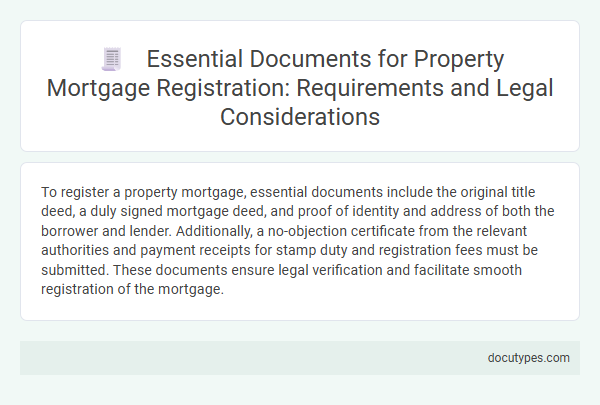To register a property mortgage, essential documents include the original title deed, a duly signed mortgage deed, and proof of identity and address of both the borrower and lender. Additionally, a no-objection certificate from the relevant authorities and payment receipts for stamp duty and registration fees must be submitted. These documents ensure legal verification and facilitate smooth registration of the mortgage.
Introduction to Property Mortgage Registration
Property mortgage registration is a crucial legal process that establishes a lender's claim on your property as security for a loan. Understanding the required documents ensures a smooth and efficient registration procedure.
- Title Deed - This document proves ownership of the property and must be submitted to verify your rights.
- Loan Approval Letter - The lender's official approval confirming the sanctioned mortgage amount is necessary for registration.
- Identification Proof - Valid government-issued ID like a passport or driver's license is required to authenticate the identities of involved parties.
Importance of Proper Documentation
Proper documentation is crucial for smooth property mortgage registration, ensuring legal validity and preventing future disputes. Accurate papers facilitate lender confidence and secure the borrower's interests throughout the mortgage process.
- Title Deed - Confirms ownership and serves as primary proof of the property to be mortgaged.
- Identity Proof - Verifies the borrower's identity and is necessary for legal verification during registration.
- No Objection Certificate (NOC) - Confirms there are no existing encumbrances or liabilities on the property.
Key Legal Requirements for Mortgage Registration
| Document | Description | Key Legal Requirement |
|---|---|---|
| Title Deed | Proof of ownership of the property being mortgaged. | Must be clear, valid, and free of disputes or encumbrances. |
| Mortgage Deed | Legal agreement outlining terms and conditions of the mortgage. | Requires notarization and must comply with local jurisdiction laws. |
| Identity Proof | Official government-issued ID of the mortgagor. | Valid photo ID such as passport or national ID to verify borrower identity. |
| Property Tax Receipts | Documents evidencing payment of property taxes. | Up-to-date with no pending tax dues to ensure clear title status. |
| No Objection Certificate (NOC) | Certificate from relevant authorities allowing mortgage registration. | Required to confirm no legal restrictions on mortgaging the property. |
| Encumbrance Certificate | Proof that the property is free from monetary and legal liabilities. | Issued by the land registry office within a specified time frame, usually last 6 months. |
| Loan Sanction Letter | Official approval letter from the lending institution. | Must detail the loan amount, interest rates, and repayment terms. |
| Possession Proof | Evidence such as sale agreement confirming your possession rights. | Must be legitimate to establish your legal right to mortgage the property. |
Identification Documents Needed
Identification documents are essential for property mortgage registration to verify the identity of all parties involved. You will need to provide government-issued ID such as a passport, driver's license, or national identity card. These documents ensure legal compliance and help prevent fraudulent transactions during the mortgage process.
Property Title Deeds and Ownership Proof
Property mortgage registration requires specific documents to verify the legal ownership and title of the property. Ensuring you have the correct property title deeds and ownership proof is crucial for a smooth registration process.
- Property Title Deeds - Official documents that legally establish ownership and detail the property's history and boundaries.
- Ownership Proof - Evidence such as sale deeds, past registration certificates, or inheritance documents confirming your claim to the property.
- Encumbrance Certificate - A certificate verifying that the property is free from any legal or monetary liabilities.
Having these documents accurately prepared and verified supports a successful property mortgage registration.
No Objection Certificates (NOC) and Clearance Papers
Property mortgage registration requires several key documents, with No Objection Certificates (NOC) playing a critical role in ensuring legal clearance. NOCs from relevant authorities confirm that there are no pending disputes or restrictions on the property.
Clearance papers prove that all dues, including property taxes and utility bills, have been settled before mortgage registration. These documents protect the lender and borrower by establishing a clear title and financial standing of the property.
Encumbrance Certificate: Significance and Necessity
Encumbrance Certificate (EC) is a crucial document required for property mortgage registration. It certifies that the property is free from any legal or monetary liabilities.
This certificate provides a detailed history of all transactions related to the property, ensuring transparency and security in the mortgage process. Your lender relies on the EC to confirm that there are no outstanding loans or disputes associated with the property. Obtaining an Encumbrance Certificate protects your investment and facilitates smooth registration of the mortgage.
Agreement to Sale and Sale Deed Essentials
Property mortgage registration requires specific documents to ensure a smooth legal process. Among the crucial documents, the Agreement to Sale and Sale Deed hold significant importance.
The Agreement to Sale outlines the terms and conditions agreed upon by the buyer and seller before the sale is finalized. It serves as proof of the intent to transfer property ownership and includes essential details like the sale price and payment schedule.
The Sale Deed is the primary legal document that confirms the transfer of ownership from the seller to the buyer. It must be properly drafted, signed, and registered to validate the mortgage transaction and protect the rights of both parties.
Key elements in the Sale Deed include the description of the property, sale consideration, and the signatures of involved parties along with witnesses. These documents facilitate the mortgage registration process with the relevant land registration authorities.
Stamp Duty and Registration Fee Receipts
What documents are required for property mortgage registration? Stamp Duty and Registration Fee Receipts are essential documents for completing the mortgage registration process. These receipts serve as proof of payment for the fees mandated by the government to legally register your mortgage.
What Documents Are Required for Property Mortgage Registration? Infographic

